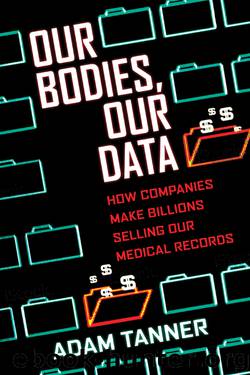Our Bodies, Our Data by Adam Tanner

Author:Adam Tanner [Tanner, Adam]
Language: eng
Format: epub
ISBN: 978-0-8070-3335-7
Publisher: Beacon Press
Published: 2016-11-27T16:00:00+00:00
Google Gives It a Try
The vision of an easily available, patient-controlled medical dossier remains stubbornly elusive, even for the world’s most successful tech companies. The ambitious goals that pioneers Larry Weed, Warner Slack, and others had begun decades before continues to elude all those who pick up the torch. With all of its brains and money, Google thought it could present patients with easy access their medical records from multiple providers in one central location. Google’s CEO Eric Schmidt described a scenario when he announced a medical record bank called Google Health in 2008: “If, God forbid, I were in the emergency room here in Florida, I’d want whoever is sitting there trying to keep me going to have access to the last N years of my radiological experiences, and I’d like them to have it instantaneously. And we can do that now.”4
Schmidt explained that Google Health would store data for patients, who could use it for everything from checking up on their vaccinations to providing access to doctors in an emergency. To help patients import data, Google signed up pharmacies (Walgreens, Duane Reade, Longs Drugs), test labs (Quest Diagnostics), middlemen (Allscripts), insurers (Aetna), and health-care providers (Cleveland Clinic, Beth Israel Deaconess Medical Center). It promised never to share data without the user’s permission, saying that profit could come from generating more business for other Google services. Schmidt noted that in 2008, there were two hundred US personal record systems, most linked to a specific company or health system. “Any scenario where information is sort of isolated is a scenario where health is not well delivered,” he said.
With past success in search, browsers, maps, and many other areas, it seemed that if anyone could succeed in attracting users, especially for a free service, it would be Google. “You sit there and say, ‘Well, this will never happen . . . five percent of people will adopt this stuff,’” he said. “That’s always true in year one. But in year ten, it is usually 70, 80 percent that have adopted it.”
Such bold pronouncements from Silicon Valley have often come true. But not so for medical dossiers. In 2011, Google gave up and closed the service. “Google Health is not having the broad impact that we hoped it would,” the company wrote in announcing its demise. “There has been adoption among certain groups of users like tech-savvy patients and their caregivers, and more recently fitness and wellness enthusiasts. But we haven’t found a way to translate that limited usage into widespread adoption in the daily health routines of millions of people.”5
Download
This site does not store any files on its server. We only index and link to content provided by other sites. Please contact the content providers to delete copyright contents if any and email us, we'll remove relevant links or contents immediately.
When Breath Becomes Air by Paul Kalanithi(7274)
Why We Sleep: Unlocking the Power of Sleep and Dreams by Matthew Walker(5659)
Paper Towns by Green John(4178)
The Immortal Life of Henrietta Lacks by Rebecca Skloot(3833)
The Sports Rules Book by Human Kinetics(3597)
Dynamic Alignment Through Imagery by Eric Franklin(3499)
ACSM's Complete Guide to Fitness & Health by ACSM(3472)
Kaplan MCAT Organic Chemistry Review: Created for MCAT 2015 (Kaplan Test Prep) by Kaplan(3429)
Introduction to Kinesiology by Shirl J. Hoffman(3306)
Livewired by David Eagleman(3134)
The River of Consciousness by Oliver Sacks(2998)
Alchemy and Alchemists by C. J. S. Thompson(2917)
The Death of the Heart by Elizabeth Bowen(2909)
Descartes' Error by Antonio Damasio(2745)
Bad Pharma by Ben Goldacre(2736)
The Gene: An Intimate History by Siddhartha Mukherjee(2500)
Kaplan MCAT Behavioral Sciences Review: Created for MCAT 2015 (Kaplan Test Prep) by Kaplan(2494)
The Fate of Rome: Climate, Disease, and the End of an Empire (The Princeton History of the Ancient World) by Kyle Harper(2443)
The Emperor of All Maladies: A Biography of Cancer by Siddhartha Mukherjee(2438)
